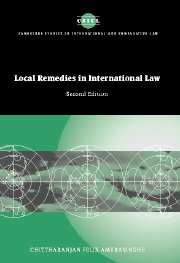Book contents
16 - A concluding appraisal
from Part V - Epilogue
Published online by Cambridge University Press: 03 May 2010
Summary
The rule of local remedies has in some respects had a distinguished history. It can hardly be said that in the context of modern international law it is defunct or has ceased to be relevant, although a tendency may have arisen to try sometimes to circumvent it by various techniques. Moreover, its explicit incorporation in the law of human rights protection, which is basically conventional at the present time, has resulted in its extension beyond its original sphere of application, thus attesting further to its importance. It may also be mentioned that an analogous rule is applied in connection with certain disputes involving international organizations. The question is not whether the rule should be jettisoned because of objections to it which certain interests that may regard the rule as an unnecessary fifth wheel in the international system of settling what are basically international disputes may have. The rule is too firmly established. Moreover, its is still to be deemed unchanged and viable. But a question that may be raised is whether it is being applied and developed in the most appropriate way.
Balancing of interests
The rule sprang up primarily as an instrument designed to ensure respect for the sovereignty of host states in a particular area of international dispute settlement. Basically, this is the principal reason for its survival today and also for its projection into international systems of human rights protection.
- Type
- Chapter
- Information
- Local Remedies in International Law , pp. 425 - 437Publisher: Cambridge University PressPrint publication year: 2004



